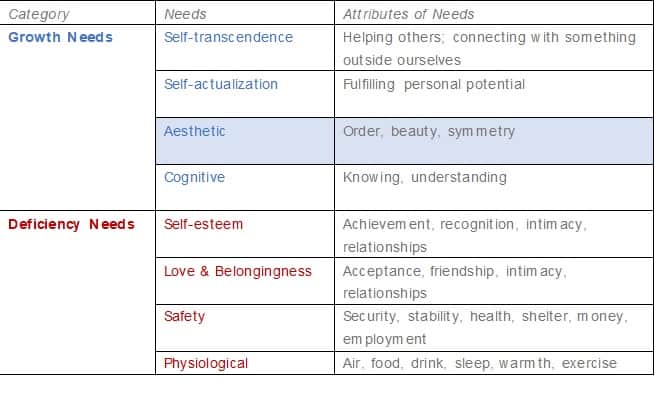Maslow and Aesthetic Growth Needs
30 June 2021
If Maslow was right, all our deficiency needs must be met before the blooming of the individual can begin. Last time, the tenacity of Maslow’s deficiency needs was explored (lower half, Table 1, below). Since then, I’ve gone to source and found hard evidence that Maslow was convinced that the satisfaction of deficiency needs is essential for full human health.
“The long-run deficiency characteristics are then the following. It is a basic or instinctoid need if:
- Its absence breeds illness
- Its presence prevents illness
- Its restoration cures illness...” (Maslow, 1968, p. 22).
As the chart below indicates, our focus has moved up to the second stage of growth; aesthetic needs characterized by order, beauty, and symmetry. I was trained as an architect, and worked in that field most of my life, so I have stronger than usual views on this need. First, I believe it is distributed with wild unevenness i.e., some people live large parts of their lives in the service of aesthetic values while others live with almost no understanding or consciousness of what constitutes aesthetic excellence or why a thing meets that criterion.
Table 1, Maslow’s Hierarchy of Needs (Atkinson and Tomley, 2012)

Contrarily, if you rate yourself as aesthetically motivated, life without beauty—architectural, musical, literary, filmic, canvas-based—brings you to Socrates’ line that the [unaesthetic] life is barely worth living.
What Does this Mean?
It means we’re all different. Based on things we will (hopefully) never be able to calculate i.e., individual genetics x individual environments x the zeitgeist (spirit of each person’s time alive), every person’s journey is hers alone. Even if we wanted to, repeating a life is utterly impossible, less because of genetic identity (which increasingly looks replicable) than the utter irreversibility of time’s forward march. Which explains why some see an unbreakable bond between psychology and philosophy. For in our vain belief that the knowledge of our time is the cuttingest of cutting edges, we ignore Heraclitus, a pre-Socratic who warned us that:
The sun is new every day (DK B7) i.e., everything—you, me, and all that we experience—is in flux and therefore changing, so hopes of replicating what happened just now...is no longer just now.
So What? Why is this Important?
If Maslow was mistaken, and we move unevenly and erratically through our needs, then it is possible some needs are shortchanged. Maslow was part of the humanist tradition. As such, it is entirely in keeping with that tradition that individual people grow in their own unique ways.
That stated, the impact of aesthetic experience—and I am reminded here of Plato’s sublime braid—truth, beauty, and goodness—can be immeasurably important.
For starters, beauty and goodness are as objective as truth itself...Beauty is. And because beauty is, the world is the way it is. If the world really is shot through with intelligibility, as the Ionians first supposed, then this intelligibility is itself beautiful, and the more intelligible it is, the more beautiful it is; and the more beautiful it is, the more intelligible it is (Goldstein, 2014, p. 30).
I know it’s confusing, but if you think about the fit between human nature and nature, it makes perfect sense. And it makes human life on earth an astonishing privilege. On a galactic scale. So, what’s the takeaway?
What I hope happened when you read that last quote, is that your mind jumped up a few levels to a more all-seeing perspective. If it did, that sort of vindicates Maslow’s lower and upper divisions. At that Platonic level of conceptualization, you left your need of self-esteem, prestige, and fashionable accessories far behind because you were starting to see into the essence of things which is where psychology ends, and philosophy begins. Does such a perspective promote growth? More upward motion next week.
Dan Chalykoff is working toward an M.Ed. in Counselling Psychology and accreditation in Professional Addiction Studies. He writes these blogs to increase (and share) his own evolving understandings of ideas. Since 2017, he has facilitated two voluntary weekly group meetings of SMART Recovery.
Comments